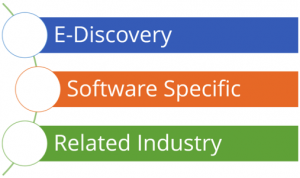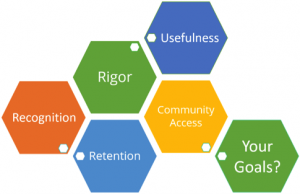Should you consider taking eDiscovery Certifications or Not?
Shortly before the Women in eDiscovery inaugural conference last month, I was asked to moderate a panel on certifications. This was a funny coincidence given that a lot of my time has been consumed by updating our VenioOne Certified Admin course over the last year, and I am currently developing a new Technical Admin course for users of our platform. The other thing that was interesting is that I’ve thought about seeking various certifications throughout the years (Microsoft, learning and development, various network and technology certifications, you name it!), but just never landed on the right certification for me at the right time. Hopefully, this article will help you decide whether to seek a certification or not.
In the session that I moderated, the panelists each maintain different certifications, either in the area of eDiscovery or related areas. Be sure you download the resource we prepared containing details about the various eDiscovery certifications and related others, as well as the process and costs involved. There is a link to it at the bottom of this post.
Speakers:
Emily Bruemmer, Associate, Jenner & Block
Certification: CIPP/US
Cristen Traylor, Counsel, McGuire Woods
Certifications: Various Relativity certifications
Patti Zerwas, Discovery Project Manager, Haynes & Boone
Certification: CEDS
Moderator: Michelle Spencer, Director of Education and Communication, Venio Systems
Types of eDiscovery Certifications
There are three types of certifications applicable for those working in eDiscovery:

General eDiscovery Industry Certifications
Panelist Patti Zerwas, Discovery Project Manager at Haynes & Boone, has the most common eDiscovery industry certification, which is the Certified E-Discovery Specialist (CEDS) offered by the Association of Certified E-Discovery Specialists (ACEDS). At one time, there were a few other eDiscovery certifications, but they have largely gone away. ACEDS is widely recognized in the industry and their certification is a good way to demonstrate broad general knowledge about eDiscovery to potential and current employers.
If you can’t afford a certification, one surprise finding in doing research for our session was a free law school level eDiscovery course offered online by Ralph Losey, Partner at Jackson Lewis, based on a class he taught at the University of Florida College of Law. Links to the course and additional information are in the handout linked in the Additional Information section at the bottom of this article.
Related Industry Certifications
There are several certifications in areas that are relied upon heavily in eDiscovery. Those are: cybersecurity, records management, information privacy, data governance, and computer forensics.
Panelist Emily Bruemmer, Associate at Jenner & Block, has the Certified Information Privacy Professional certification or CIPP/US, which is offered by the International Association of Privacy Professionals (IAPP). This certification focuses on privacy laws, regulations and frameworks, and has both US and European versions. IAPP also offers the Certified Information Privacy Manager (CIPM) and Certified Information Privacy Professional Technology (CIPT) certifications, which focus on slightly different content as indicated by their titles.
IAPP has also recently started offering the Privacy Law Specialist specialization for US attorneys through the ABA. This specialization has very stringent requirements. To start, one must first hold the CIPP/US certification and either the CIPM or CIPT certification.
Other related industry certifications covered in the handout linked below are the: Certified Information Professional, Information Governance Professional, Certified Records Manager, and Certified Records Analyst, all of which focus more specifically on records management and information governance.
Each of these area-specific certifications demonstrates a greater depth of knowledge and expertise in a specific niche industry or area related to eDiscovery.
Software-Specific Certifications
Software-specific certifications have been around since the early days of eDiscovery at the turn of the century – back when Summation and Concordance ruled the land. While they may not contain as much general knowledge as an industry certification or go as deep as an area-specific certification, they are a great way to increase your depth of knowledge of a particular eDiscovery software platform or tool, which pays big practical dividends.
Given the fact that most people only use a small portion of the capabilities of most software, these can be very valuable certifications to have for your current role as they literally mean saved time and money in the matters you are handling. The most widely known certifications are those held by panelist Cristen Traylor, Counsel at McGuire Woods, who holds several Relativity certifications.
Other eDiscovery software companies offer similar certifications like our Venio Certified Administrator program. What I hear from our partners who attend is that they gain a much broader knowledge of the entire platform and greater understanding of the processes in those areas in which they may not work on a daily basis. This helps them to see where their day-to-day tasks and role fit in the bigger picture and understand the needs and constraints in other areas.
Some eDiscovery software companies also offer more specific certifications as well (like the Venio Technical Administrator program that I am currently developing). Those types of software certifications have great practical value to an employer in the deeper knowledge they impart but may not have as much broad value to an individual in their career as a more general certification might. The value derived just depends on what your specific needs and goals are.
Why Get an eDiscovery Certification?
The most common reasons an individual would seek certification are:
- Advancing or gaining knowledge and skills for their current role
- Seeking to advance to another role
- Staying current on industry topics and trends
- Gaining or deepening knowledge and skills in a related subject area
Companies might encourage their staff to seek certifications as a way to:
- Increase the level of expertise of their employees
- Demonstrate investment in their employees’ professional development
- Save money or reduce the time spent on the eDiscovery projects they handle
- Better serve their clients
Preparation/Time Involved
All of these certifications require a significant investment of time and money. Frequently, an employer will cover the cost of the course and/or test. However, the investment of time rests solely on the individual, unless their employer agrees to allow time spent studying and testing during work hours. If your employer is not willing to pay for your certification, perhaps you might request some time during work hours to study or take the exams.
Nice to Have or Need to Have?
At this point, most certifications are still nice to have versus required by employers. However, they can give you a leg up in finding employment in the eDiscovery industry, because those in the session audience stated that they definitely look to see if someone has a certification as an indication of both the individual’s knowledge level and motivation to stay current or increase their knowledge on an ongoing basis.
With traditional college education coming under fire lately for not giving people practical knowledge and skills, there is a lot of talk within talent development circles about credentialing via things like the certifications described above. If things continue to trend in that direction, then certifications could become an even more valuable asset.
What Makes a Good eDiscovery Certification?
 When looking at a certification, you should consider and investigate the following items:
When looking at a certification, you should consider and investigate the following items:
- How rigorous is the content and certification exam?
- How is the course content delivered? Is it done well? Will you retain what you learn?
- How well recognized and respected is the certification in the industry?
- Will you gain access to a community and/or additional knowledge sharing?
- How well does the certification align with your career goals?
Benefits/ROI of Certification
Each panelist indicated they were pleased they completed their certifications and would do it again. They also all said that they have used the knowledge gained to bring additional value in their current roles, but that their certifications weren’t required by their current employers. For both you and your employer, deciding whether to seek a eDiscovery certification or not is a matter of weighing the time and cost investment against the benefits that you will receive. Hopefully, the information we have shared will help make your decision easier.
Additional eDiscovery Certifications Information
Additionally, we compiled a list of common certifications and basic information about what is involved and their costs. We have also included links to the entities offering the certifications. Please download eDiscovery Certification Options for more information.
Request a Venio Systems Demo – an eDiscovery Solution can save costs and bring more value to enterprise organizations.